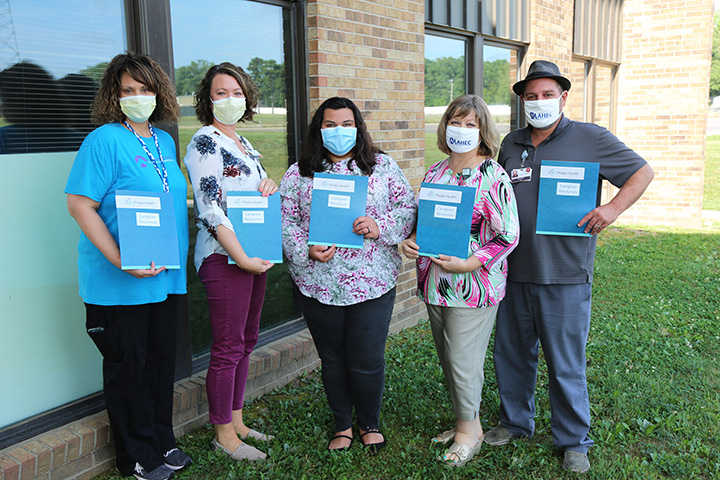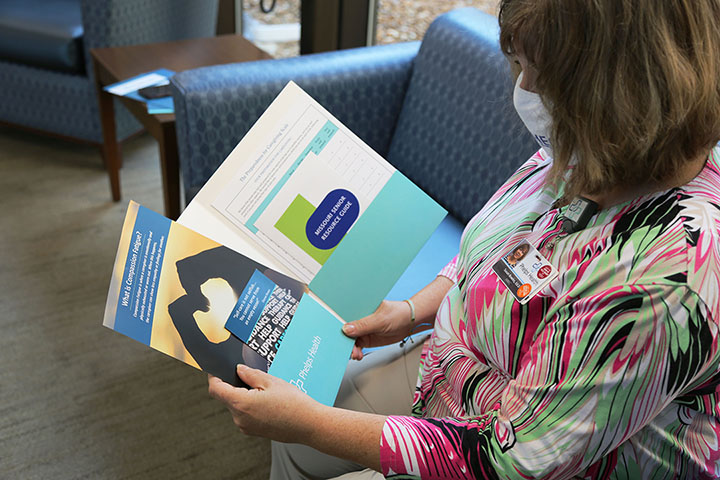
Published on September 3, 2021
Read Time: Three Minutes
Thanks to a federal grant, caregivers in Phelps Health’s service area and other regions in Missouri can be better informed, better prepared and better able to care for their own needs.
A $3.75 million, five-year grant funded by the U.S. Department of Health and Human Services (HHS) was awarded to the Saint Louis University Geriatric Education Center (GEC) Geriatrics Workforce Enhancement Program (GWEP).
A.T. Still University’s Area Health Education Center (ATSU AHEC) Program Office works with seven regional AHECs across the state to support and grow the healthcare workforce in Missouri. Phelps Health hosts Mid-Missouri AHEC, which covers 23 counties in mid-Missouri.
A.T. Still University’s Area Health Education Center (ATSU AHEC) Program Office was a recipient and provided Mid-MO AHEC with over $8,600 for this project as part of the GWEP grant. This grant was used to create caregiver resource packets to provide caregivers resources for self-help.
According to Susan Bowles, health careers coordinator with Mid-MO AHEC, Care Management staff at Phelps Health will offer the packets and a Rapid Caregiver Well-Being Scale to caregivers and those interested in learning more about caregiving.
Caregiver Resource Packets
The packets will be given to caregivers of patients who require long-term care when the patients are dismissed to homecare. Bowles said that homecare is being utilized more, and many patients are also having more complicated health issues.
“Because of this, caregivers are reporting increased mental and physical health themselves,” she said. “These packets will give hope and assistance to caregivers and help them address their own needs.”

Each packet includes the following:
- A magnet with caregiver tips and a phone number to Phelps Health if caregivers need assistance
- A flyer about compassion fatigue (emotional and physical exhaustion leading to a reduced ability to empathize or feel compassion for others) and ways to help caregivers with compassion fatigue
- A Missouri Senior Resource Guide
- A Preparedness for Caregiving Scale survey (this survey has already been given to more than 50 caregivers as part of this grant to help increase data about caregivers in Missouri)
- A form to record important information and questions for the healthcare team in one place
Bowles noted that professional healthcare providers, who also exhibit some stresses, could use these resource packets.
Rapid Caregiver Well-Being Scale
The Rapid Caregiver Well-Being Scale is given to caregivers during a patient’s doctor’s office visit or hospital stay. The well-being scale also can be given to caregivers when they have their own doctor’s appointments.
The well-being scale, a one-page document, asks caregivers if their basic needs, including physical, emotional and self-security needs, are being met.
Natalie Turnbough, a care manager at Phelps Health, said what she and other care managers or social workers learned by providing the well-being scale to caregivers was that “it allowed the caregivers to express a lot of the loneliness, isolation, fear and frustration they feel. Most caregivers said they had never had anyone ask them how they were doing.
“It [well-being scale] opened up a deeper dialogue between the care manager and the caregiver to discuss some of the barriers faced at home and address issues that may have caused complications in the discharge plan of their patient,” Turnbough said.
To learn more about caregiver resource packets at Phelps Health, please call (573) 458-7383.
This project is supported by the Health Resources and Services Administration (HRSA) of the U.S. Department of Health and Human Services (HHS) under grant number U1QHP28716 Geriatrics Workforce Enhancement Program for $750,000/year for 5 years. This information or content and conclusions are those of the author and should not be construed as the official position or policy of, nor should any endorsements be inferred by HRSA, HHS, or the U.S. Government.